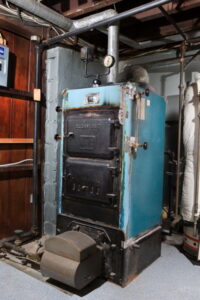If your furnace has been chugging along for 15, 20, or even 25 years, you might be wondering whether there’s any way to keep it running for a few more seasons. As HVAC contractors who offer furnace service in Perry, GA, we’ve seen many homeowners wrestle with this question. While repairing an older furnace might seem like a cost-effective solution in the short term, there are several reasons why it’s often better to consider a replacement. Here’s a detailed look at the pros and cons of salvaging a very old furnace and when it makes sense to invest in a new one.
The Challenges of Repairing an Old Furnace
1. Inefficiency
Older furnaces are significantly less efficient than modern models. Most furnaces installed 20 years ago or more have efficiency ratings (AFUE) of around 65–75%. Compare that to today’s high-efficiency furnaces, which can achieve ratings of 90–98%.
This inefficiency translates directly into higher energy bills. Even if you manage to repair your old furnace, you’ll continue paying more every month to heat your home. Over time, these increased costs can outweigh the expense of purchasing and installing a new furnace.
2. Increasing Repair Costs
As furnaces age, their components naturally wear out. Finding replacement parts for older models can become increasingly difficult—and expensive. If your furnace is already 15-20 years old, chances are you’ll face frequent breakdowns that require costly repairs.
For example, replacing a heat exchanger or blower motor on an older furnace can cost several hundred dollars, and that’s assuming the parts are still available. In some cases, you might find yourself waiting weeks for a specific component to be shipped, leaving you without heat during the colder months.
3. Safety Concerns
An antiquated furnace can pose serious safety risks. Over time, the heat exchanger — responsible for separating combustion gases from the air inside your home — can crack. A cracked heat exchanger can leak carbon monoxide, a deadly gas that’s odorless and colorless.
Older furnaces are also more prone to developing issues like faulty pilot lights, gas leaks, and electrical problems, all of which can pose risks to your household. Even with regular maintenance, the risk of hazardous malfunctions increases as a furnace ages.
Signs It’s Time to Replace Your Furnace
While every situation is unique, there are some clear signs that it’s time to stop pouring money into an old furnace and invest in a new one:
- Frequent Breakdowns: If your furnace has required multiple repairs in the past year, it’s likely reaching the end of its lifespan.
- Rising Energy Bills: An unexplained increase in your heating costs is a strong indicator that your furnace is no longer running efficiently.
- Uneven Heating: Older furnaces often struggle to maintain consistent temperatures throughout the home, leaving some rooms too cold and others too warm.
- Loud or Unusual Noises: Banging, rattling, or squealing noises are often signs of significant internal wear.
- Age: If your furnace is 15–20 years old or older, replacement should be on your radar, even if it’s still running.
Repair or Replace?
While it might be possible to repair a very old furnace, it’s rarely the most cost-effective or safe option. If your furnace is more than 15–20 years old and you’ve noticed any of the signs mentioned above, it’s time to seriously consider replacement. The upfront investment in a new furnace pays off in lower energy bills, fewer repair costs, and improved home comfort. Our team can assess your current furnace, provide honest recommendations, and guide you through the process of selecting and installing a new system.
Experience the Premier Difference! Premier Heating & Air has been family-owned and operated since 2001.


